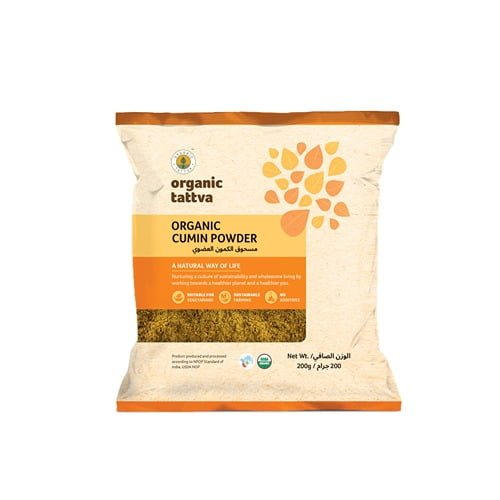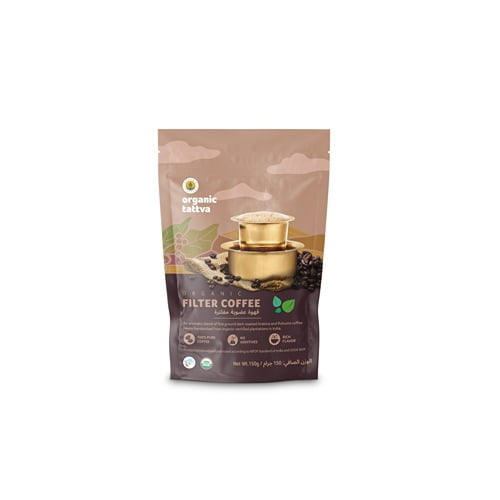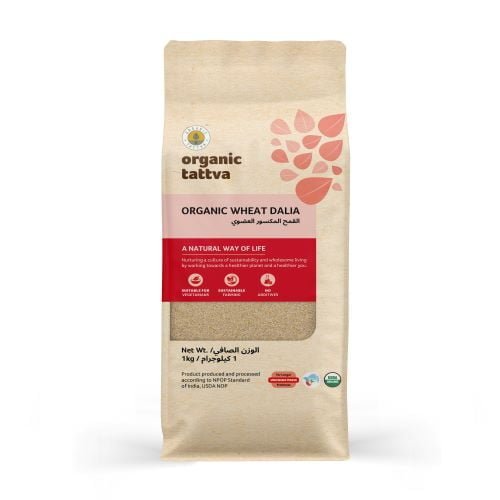Introduction to Organic Besan and Organic Tattva
Organic Tattva stands as a beacon in the realm of organic farming, embracing sustainability, purity, and health. The brand’s unwavering dedication to organic agriculture underscores its mission to provide high-quality, natural products. Among its diverse offerings, organic besan, or gram flour, holds a special place due to its profound benefits and versatility in culinary uses.
Organic besan, known for its rich nutritional profile, is an indispensable element in various diets worldwide. It is a powerhouse of carbohydrates, proteins, and essential vitamins, including B-complex vitamins and folate. Such nutrients contribute significantly to energy production, muscle repair, and overall well-being. Beyond nutrition, organic besan aids in improving digestive health and regulating blood sugar levels. Its low glycemic index makes it an excellent choice for individuals managing diabetes and those seeking healthier lifestyles.
Yet, what truly distinguishes Organic Tattva’s besan is the brand’s stringent adherence to quality and purity. The journey of Organic Tattva’s besan begins with the selection of the finest organic chickpeas, cultivated without synthetic pesticides or genetically modified organisms (GMOs). These chickpeas undergo meticulous processing to produce flour that retains all its natural goodness and nutritional potency.
Organic Tattva’s commitment to sustainability extends beyond production. The brand champions eco-friendly packaging and ethical supply chain practices, ensuring that every step from farm to table supports environmental conservation and fair trade policies. This holistic approach resonates with health-conscious consumers and advocates of sustainable living alike.
By choosing Organic Tattva’s organic besan, consumers align themselves with a movement towards better health and environmental stewardship. This brand not only delivers a product but also champions a philosophy of living in harmony with nature, underscoring the significance of organic practices in modern consumption.
Nutritional and Health Benefits of Organic Besan
Organic besan, also known as chickpea flour, is not only a versatile culinary ingredient but also a powerhouse of nutrition. A significant feature of organic besan is its high protein content, which makes it an excellent choice for those seeking plant-based protein sources. This is particularly essential for vegetarians and vegans. Additionally, the presence of dietary fiber in organic besan aids in digestion and contributes to a feeling of satiety, which can help in weight management.
The flour is rich in essential vitamins such as B vitamins, including folate (B9) that supports metabolic functions and cellular growth. Vitamin B6, another critical component, plays a vital role in cognitive development and function. Organic besan is also a good source of minerals like iron, magnesium, and zinc which are crucial for immune function, bone health, and metabolic processes.
Regarding its health advantages, various studies have underscored the role of organic besan in improving digestion due to its high fiber content. Insoluble fiber in besan helps regulate bowel movements and prevent constipation. Moreover, several case studies suggest that incorporating organic besan into one’s diet can result in better blood sugar management. Its low glycemic index helps in maintaining stable blood sugar levels, thereby reducing the risk of type 2 diabetes.
Expert nutritionists often recommend organic besan for weight management. The combination of high protein and fiber ensures that one feels full for a more extended period, potentially reducing unnecessary calorie intake. Furthermore, the presence of complex carbohydrates means a slow and steady release of energy, which is beneficial for sustained physical activities.
In sum, organic besan is not just a culinary delight but a nutritionally rich ingredient that offers multiple health benefits. By incorporating organic besan into your diet, you can enhance your overall health while enjoying a versatile and delicious food item.
Global Market for Organic Products: Trends and Opportunities
The global market for organic products has been experiencing significant growth over the past decade. A diverse range of factors contributes to this trend, including rising consumer awareness of health issues, environmental concerns, and the overall benefits of sustainable food choices. This increasing demand extends to various organic staples, including organic besan — a flour derived from chickpeas and a key ingredient in many global cuisines.
The burgeoning interest in organic besan reflects broader consumer trends towards high-quality, non-GMO foods that support overall health and well-being. According to recent market analysis, the global organic food and beverage market is expected to grow by 14% annually, reaching a value of $OrganicFoodMarketValue by 2027. This growth is accelerated by consumer preferences shifting towards organic products, particularly in Europe and North America, regions that have seen substantial increases in organic food consumption.
Entering the global market for organic besan presents both opportunities and challenges. On the one hand, the demand for organic products continues to outpace supply, creating a fertile ground for expansion. Companies like Organic Tattva are well-positioned to capitalize on this trend by leveraging their expertise in sourcing and processing high-quality organic chickpeas. By ensuring stringent adherence to organic farming practices and developing robust distribution networks, Organic Tattva aims to meet global demands effectively.
However, navigating the global market also requires overcoming certain challenges. Regulatory requirements for organic certification vary by country, necessitating meticulous compliance to access these markets. Additionally, supply chain complexities, such as ensuring the consistent quality and traceability of organic products, can pose significant hurdles. Addressing these challenges involves continuous investment in quality assurance processes and forging strong partnerships with organic farmers and distributors worldwide.
Experts in the field underscore the importance of innovation and strategic adaptation to thrive in this competitive landscape. Dr. Jane Smith, an organic market analyst, notes, “Companies must able to rapidly respond to market dynamics and consumer preferences while maintaining the integrity and authenticity of their organic products.” This highlights how Organic Tattva’s commitment to organic farming, transparency, and sustainability is crucial to its success in the global arena.
In summary, the global market for organic products, including organic besan, presents substantive opportunities for growth. By addressing the associated challenges through strategic planning and adherence to organic principles, companies like Organic Tattva are carving out a significant niche in this expanding market.
Future Prospects: Collaborating for a Sustainable and Healthy Future
In the evolving landscape of the organic sector, international collaborations and partnerships represent a pivotal strategy for promoting sustainable agriculture and ensuring a consistent supply of high-quality organic products. As we navigate the complexities of global food systems, the strength of these alliances becomes increasingly apparent.
One of the primary advantages of forming global alliances in the organic industry is the sharing of best practices and innovative techniques. By working together, countries and companies can exchange knowledge on organic farming methods, pest control solutions, and soil management practices. This collaboration extends beyond mere information exchange; it fosters a sense of unity and shared responsibility towards global food security and environmental conservation.
Several success stories underscore the potential of international partnerships in the organic sector. For instance, the European Union’s collaboration with several Asian countries has led to significant advancements in organic certification and accreditation processes. These efforts not only standardize organic practices across borders but also enhance market access for small and medium-sized organic farmers. Such initiatives highlight the mutual benefits of global cooperation in creating a robust organic supply chain.
Looking ahead, Organic Tattva is poised to take a leading role in these global collaborations. By partnering with international organizations, research institutions, and like-minded companies, Organic Tattva aims to drive innovation and sustainability in organic agriculture. Future partnerships will focus on enhancing organic product quality, improving logistic efficiencies, and expanding market reach. This strategic approach will not only benefit Organic Tattva but also contribute to the global momentum towards sustainable and healthy food systems.
In essence, the future of organic farming hinges on strong international alliances. As global stakeholders come together, the collective effort will pave the way for a greener, healthier, and more sustainable tomorrow. Through these collaborations, the vision of a world where organic products are the standard and not the exception is within reach. Organic Tattva, with its commitment to excellence and sustainability, stands ready to lead this transformative journey.












Reviews
Clear filtersThere are no reviews yet.